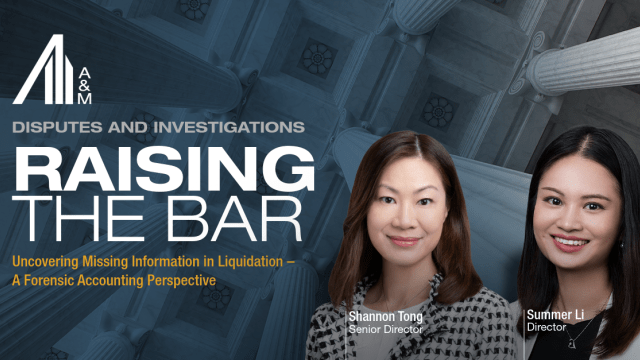Fraud Risks Faced by Single Family Offices – Key Insights from STEP Singapore Seminar
Managing Director Frankie Leung and Senior Director Jon Nicklin from A&M’s Disputes and Investigations team were invited to speak at a seminar organized by the Singapore branch of the Society of Trust and Estate Practitioners (STEP). The seminar focused on the potential fraud risks faced by single family offices (SFOs) and provided key strategies to mitigate such risks. During the session, Frankie and Jon discussed how forensic accounting services can be used to trace misappropriated assets. They also shared helpful compliance insights using real case studies.
SFOs are specialized entities established to manage the assets of high-net-worth individuals or families. Typically, an SFO has a tight organizational structure and operates in a relatively informal manner, with the core goal of preserving and growing wealth. Given the high value of assets managed, balancing high returns with robust governance, process management, and due diligence systems has become crucial for risk control and fraud prevention. Key steps to achieve this include managing communications between family members and management teams, managing corporate financial information, and controlling cash flow.
Although Singapore is renowned as a prestigious financial center with an established legal system and stable business environment, fraud does still occur amongst SFOs. One recent example in early 2025 was a Singapore-based SFO whose former employees misappropriated millions of dollars. Studies show that, globally, such employee embezzlement is the most common type of fraud. [1]
The Singapore government is looking to attract family offices and grow its wealth management sector. However, risks are still present that need to be mitigated. One such risk stems from how SFOs are usually managed by a small number of employees or a single manager with close-knit relationships within the team, leading to power being overly concentrated in one person or small group and insufficient checks and balances. These circumstances can result in inadequate scrutiny of key decisions, increasing the risk of misconduct or fraud. Common frauds that occur within SFOs include false employee reimbursements, unauthorized salary payments, manipulation of third-party transactions, financial statement falsification, and document forgery.
Data indicates that in most fraud cases, over half of the allegations were substantiated, meaning they resulted in credible evidence of wrongdoing. [2] By implementing effective prevention measures, SFOs can reduce financial losses and protect reputation and operational security. Notably, these cases often show warning signs beforehand. Stakeholders can detect potential fraud risks by identifying and analyzing anomalies such as:
- Sudden changes in lifestyle (e.g., lavish spending, frequenting luxury venues)
- Increased high-risk investments
- Abnormal fluctuations in financial data of the SFO (e.g., unusual increase in costs/expenses or decrease in assets)
Weak internal controls in SFOs mainly stem from insufficient supervision of management teams, excessive trust in managers, and lack of sound compliance and internal control systems. To help address these risks, forensic accounting experts can assist SFOs through:
- Asset source verification
- Internal control system review
- Tracing misappropriated funds
- Providing litigation support through expert witness reports
The STEP seminar offered practical fraud risk prevention strategies to help SFOs grow and preserve wealth while minimizing risks and achieving sustainability. To learn more about internal fraud in the Asia-Pacific region and fraud risk mitigation strategies, read our article, “Combating Increased Internal Fraud: Lessons from Recent Cases and Proactive Risk Mitigation Strategies.” [3]
[1]. “In-House Fraud Investigation Teams: 2025 Benchmarking Report,” Association of Certified Fraud Examiners, accessed July 14, 2025, https://www.acfe.com/-/media/files/acfe/pdfs/in-house-fraud-investigation-teams-benchmarking-report-2025.pdf
[2]. Ibid.
[3]. Kelvin Cheong, “Combating Increased Internal Fraud: Lessons from Recent Cases and Proactive Risk Mitigation Strategies,” Alvarez & Marsal, June 26, 2025, https://www.alvarezandmarsal.com/thought-leadership/combating-increased-internal-fraud-lessons-from-recent-cases-and-proactive-risk-mitigation-strategies

